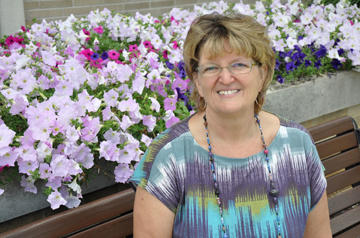Purdue Profiles: Sue Wilson
September 24, 2012
 |
|
Sue Wilson, director of
school partnerships at Purdue North Central, has built the campus'
Concurrent Enrollment Program from the ground up. She also participates
in mission
trips overseas. (Purdue University North Central photo/Dana Krill) |
In all aspects of her life, Sue Wilson loves helping others -- whether it's giving high school students a head start on their college credits or cleaning up a war-torn city in Bosnia.
As director of school partnerships at Purdue North Central, Wilson has helped build the Concurrent Enrollment Program (CEP) from the ground up. The program allows qualified high school students to take accredited college courses in their own schools.
In addition, since 2000 Wilson has participated in overseas mission trips, and she provides care and encouragement for those serving in full-time ministries locally and abroad.
What is the concurrent enrollment program’s background?
CEP offers accredited college courses that are reviewed and approved by the appropriate department on our campus. CEP instructors must meet the criteria for part-time instructors at Purdue North Central, and students must go through an application process to enter the program. We've run CEP since the 2004-05 academic year, when it started out with one school, LaPorte High School, and one course, which was probability and statistics. Fourteen students were enrolled.
Since then, it's grown to include 47 high schools in 12 different counties, all located in Northwest Indiana. This semester we have 2,456 students enrolled in 300 sections of the 37 CEP courses offered. The program really has grown by leaps and bounds recently; in the past two years, each year the enrollment has almost doubled.
Why do you think the program has been so popular?
For one, it's a very cost-effective way to get a head start on college. For courses on the state's priority dual credit course list, which includes basic courses such as math, science and literature, tuition is $25 per credit hour. The Purdue Board of Trustees sets the tuition for other courses, but it's still very reasonable.
The thing that's so great about this program is that it allows students to begin college with college credits. These credits are accepted at our campus. They're also very transferrable to other universities, so there's a lot of flexibility involved. Earning credits early allows students to graduate more easily in four years. At the same time, it opens a variety of other opportunities, as well.
How did you become involved in the program?
Even though I've only been in my current role for eight years, I've actually worked at PNC for 20 years altogether. Before taking on this position, I worked as the advisor coordinator for Success Through Education, a federal talent search program, for eight years. Then, I was the associate director of admissions for four years. I'm a very relational person -- I love working with and helping people -- and so I was asked to lead CEP.
What overseas mission work have you done?
As part of my personal life, my husband and I have been able to travel overseas with our church, Liberty Bible Church in Chesterton. A place that has really grabbed our hearts is Sarajevo, Bosnia. We’ve gone several times starting in 2000. The first time, we were there for two weeks. Having never seen war devastation first hand, it took several days to begin to effectively process what we were experiencing.
The Bosnian people have really rebounded since our first trip. Bosnians are wonderful people, and we are always blessed by our time spent with them. We have repaired buildings, fixed plumbing, completed interior painting and cleaned up large outdoor areas. We have listened to stories of how the war has impacted their lives.
We've also done prayer walking, which involves walking throughout the city and praying for the people and the neighborhoods In addition to getting to know the people and their culture, another great blessing has been the interaction with many of the missionaries in Bosnia, who deeply care for this nation, which has become their home.
What are your plans to help provide care and encouragement for other missionaries?
Throughout our lives, we've walked beside some very tremendous yet drained and worn-out people who are serving in full-time ministry. I don't think people in general realize how much understanding and support missionaries and pastors need.
For the past few years, we've been training to increase our knowledge and skills, and to become more aware of existing needs and opportunities to serve. We’ve completed life-coaching training and counseling courses, and we have begun networking with organizations that provide missionary and pastoral care. In the next couple of years, perhaps after retirement, we're looking forward to doing this type of work full time, wherever God leads.
Overall, there is a great amount of joy in helping others, no matter in what form you're doing it. It completes one's purpose in life. I want to do whatever I can do to help others make their lives better and more meaningful.
Writer: Amanda Hamon, 49-61325, ahamon@purdue.edu

